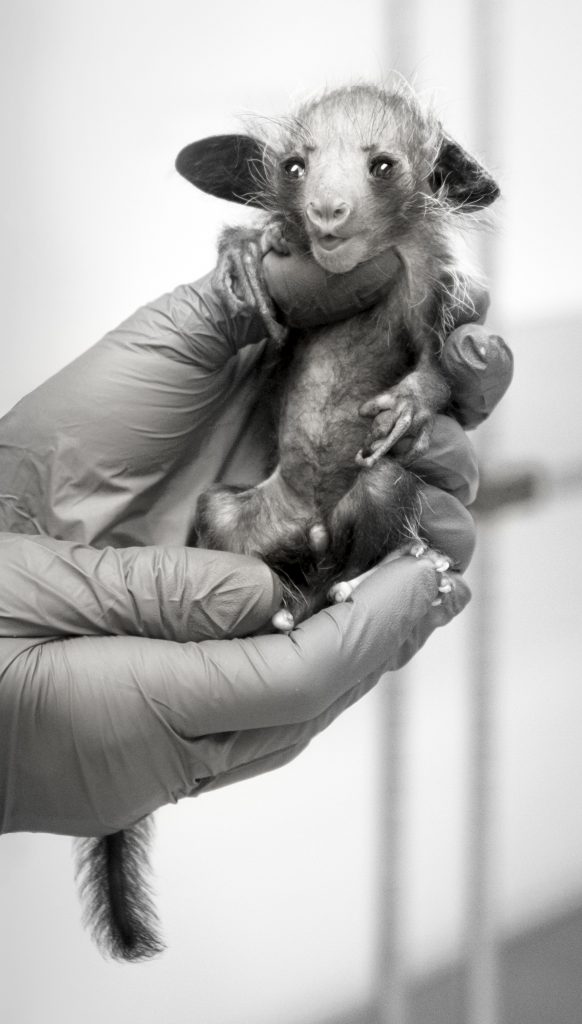
Agatha, shown here at six days old, is the first aye-aye born at Duke in six years. Photo by Sara Clark.
By Sara Clark
The Duke Lemur Center recently welcomed another newborn — a rare baby aye-aye.
Named after best-selling mystery writer Agatha Christie, the infant is the first aye-aye born at the Duke Lemur Center in six years, and one of only 24 of her kind in the United States.
Third-time mom Medusa gave birth to the baby on June 7, 2017. Both mother and baby have been kept behind the scenes while baby Agatha gains strength.
Born weighing a mere 74 grams, or slightly more than a Snickers bar, she was only two thirds the typical birth weight for her species, so Agatha’s early care was a round-the-clock task.
“Agatha was a unique case,” said Cathy Williams, veterinarian at the Duke Lemur Center for 21 years. “She required intervention by the veterinary staff to provide supplemental warmth and formula until she gained enough strength that she could return to her mom full time.” (Watch video footage of one-month-old Agatha’s routine weigh-ins HERE.)
Between feedings, veterinary staff used a “baby cam” to monitor mom and baby’s behavior.
Now three months old, the big-eared, bright infant is thriving. “She’s becoming more active,” says Steve Coombs, Agatha’s primary technician. “She’s tapping branches. She sleeps with Medusa in the nest box, and the interaction I see is mostly nursing. She’s calm, and Medusa is back to her easygoing self.”
Nocturnal primates with bushy tails and bony middle fingers, aye-ayes are endangered on their native island of Madagascar, where logging, slash-and-burn agriculture and hunting are suspected to have cut their numbers in half in recent decades.
Some villagers in Madagascar believe these lemurs are evil omens and can curse a person by pointing their middle fingers at them; hence many aye-ayes are killed on sight.
In reality, Williams said, the aye-aye is one of the gentlest lemur species. “They’re not at all aggressive, they’re extremely curious and energetic and they’re very intelligent — they learn very quickly.”
Agatha’s parents Medusa and Poe were deemed a good genetic match by the Association of Zoos and Aquariums’ (AZA) Species Survival Plan (SSP).
Poe arrived at the Duke Lemur Center from Madagascar in 1987, and was one of the first aye-ayes ever imported to the United States. At the time, Poe and seven additional animals imported by Duke between 1987 and 1991 represented the only aye-ayes in the world within human care.
Today, all but one of the aye-ayes in North America — as well as others overseas in London, Frankfurt, Bristol and the Jersey Channel Islands — are descendants of these eight founders.
Agatha is the third aye-aye born in North America in the last two years. Her birth is a welcome development for the Duke Lemur Center, which tragically lost four adult aye-ayes last year to poisoning from a natural toxin found in avocados, not previously recognized as a threat to lemurs.
Agatha will stay with her mother for two to three years while she learns how to forage for food, build a nest and other aye-aye survival skills.
Visitors won’t be able to see baby Agatha, but they can see two of the center’s other aye-ayes, Endora and Ozma.
In the meantime, the Duke Lemur Center works diligently to maintain a genetic safety net for aye-ayes in the wild.
“I haven’t been this happy about the birth of a baby primate since my son was born,” said Duke Lemur Center director Anne Yoder.
Slider images (above) by David Haring. Video footage courtesy of Sydney Dye.
![]()
Agatha in the news:
Baby Agatha grows up (feat. the cutest image in all the world!)
November 10, 2017
Agatha featured on ZooBorns!
October 2, 2017
How SAS helped save a baby lemur’s life
September 26, 2017
Durham Herald-Sun
How data is helping save the world’s most endangered mammals
September 25, 2017
SAS Voices
Rare lemur born in North Carolina
September 25, 2017
88.5 WFDD
There’s a new lemur in town
September 25, 2017
Duke Chronicle
Rare baby aye-aye born at Duke Lemur Center
September 21, 2017
Patch.com



